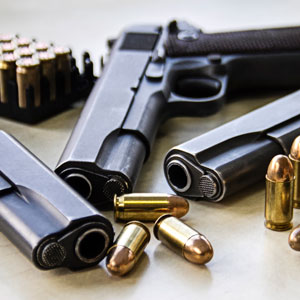GPs should receive a ‘reasonable fee’ for checking medical records and monitoring patients who possess a firearms licence, according to members of the House of Lords.
Under new proposals, being discussed in Parliament, GPs should get an ‘agreed’ fee for carrying out the medical checks – an area where there is currently ‘no consistency’ across England and Wales.
Firearms and shotgun certificates should also be extended from five to 10 years to ‘reduce pressure on licensing departments’, the Lords said.
The proposed measures were discussed during the second reading of the Offensive Weapons Bill – announced in June – in the House of Lords, which was put forward in response to a rise in violent crimes involving knifes and firearms across the country.
GPs have been involved in the firearms application process since 2016, when they were asked to place a ‘firearm reminder’ code in the records of all patients who have a gun and inform police whether those were at risk of developing a mental health issue.
At the time the BMA’s guidance was vague when it came to GPs being allowed to charge for the service, but they later advised GPs to reject all requests from the police due to a lack of funding.
However, under new proposals by the Lords, there could be an ‘agreed’ fee that GPs can charge.
During the second reading of the bill this month, the Earl of Shrewsbury Charles Chetwynd-Talbot said: ‘In England and Wales, there is no consistency of practice between police forces, nor is there any consistency of the fee charged to the applicant by his or her GP for a medical assessment.’
The Earl of Caithness Malcolm Sinclair said: ‘The third (proposal) is an agreed reasonable fee for the GP’s initial medical records check and placing the enduring marker. On that, the Home Office has said that there should not be a fee for the initial check but, quite clearly, there is evidence that GPs are already charging a fee.’
The proposed process mandates:
- A compulsory and once-only medical records check by a GP in response to a police inquiry about the physical and mental health of the applicant.
- An enduring marker to be placed by the GP on the patient’s medical record noting that he may be in possession of a firearm or shotgun, to ensure that thereafter the GP is reminded to draw to the police’s attention any future adverse change in the patient’s health that may have a bearing on his ability safely to possess a firearm or shotgun.
- An agreed reasonable fee for the GP’s initial medical records check and placing the enduring marker.
- An extension of the life of firearms and shotgun certificates from five to 10 years, which will reduce pressure on licensing departments.
- A protection on the confidentiality of applicants and certificate holders’ data.
BMA’s GP Committee deputy chair Dr Mark Sanford-Wood told Pulse: ‘The firearms licensing process is primarily intended to ensure public safety, and the BMA supports moves towards an appropriately resourced system to minimise the risks of gun ownership. There can be no half measures when it comes to the licensing of weapons that can be used with lethal outcomes.
‘The questions of structured medical reports, firearms flags and the extension of the licensing cycle to 10 years have all been discussed in the context of a clear and funded framework.’
The BMA previously said GPs can conscientiously object to taking part in the firearms process without providing the patient with an alternative.
Pulse October survey
Take our July 2025 survey to potentially win £1.000 worth of tokens













